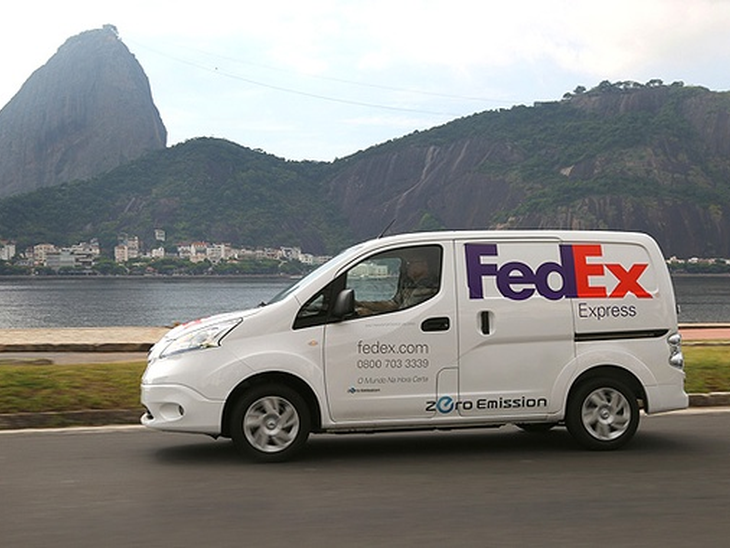Nissan and FedEx Express to test 100% electric van
Tests will be conducted in Rio de Janeiro.
FedEx Express23/01/2014 18:15

In January, Nissan Motor Co., Ltd., and FedEx Express, a subsidiary of FedEx Corp. and the world’s largest express transportation company, will start testing the Nissan e-NV200, a 100% electric light commercial vehicle, under real conditions in Brazil. The trial, which will take place in the city of Rio de Janeiro, where Nissan’s Brazil headquarters are located, is part of the vehicle’s global assessment and development program, which is being carried out jointly by the two companies. This is the first time the model will be running on the American continent. So far, the two partners have tested the e-NV200 in Japan, in the United Kingdom and Singapore and soon tests will be held in the United States.
The assessment program unites two companies strongly committed to reducing the environmental impacts of their operations around the world. The choice of Brazil as a participant in the e-NV200 evaluation program is evidence of the relevance of the country to companies whose goal is to grow their local operations in a sustainable manner. Nissan, for example, is preparing to open one of its most sustainable plants in Resende, in the state of Rio de Janeiro. “The opportunity of testing the e-NV200 in Brazil is a testimony to the fact that 100% electric vehicles are also feasible in the domestic market. We are also testing 25 units of the EV LEAF by means of a taxi pilot project in the cities of Rio and São Paulo, as well as patrol car in Rio de Janeiro, where two units were made available to the city’s Police Department”, says François Dossa, President of Nissan in Brasil.
“As a global leader in the use of electric vehicles in the transport and logistics industry, FedEx is committed to bringing innovative and different alternatives to the market in order to find the best solutions to lower CO2 emissions and increase the company’s operating efficiency,” says Mike Murkowski, Senior Vice President of Operations for FedEx Express South America. In December, the company put six electric vehicles in service for its operations in Rio de Janeiro and Sao Paulo. The introduction of the electric car in the Brazilian operation is part of EarthSmart,R FedEx’s global sustainability platform designed to guide the company’s environmental commitment in the communities where it operates.
Nissan is supplying FedEx Express with an e-NV200 for field tests, to be used as a delivery vehicle for approximately a month. After this period, the two companies will evaluate the model’s potential as a cargo delivery vehicle. The results found will make a significant contribution to the development of the mass production version of the e-NV200, which will start this year at Nissan’s plant in Barcelona, Spain.
Nissan’s second 100% global electric vehicle
The e-NV200 will be the second EV to be globally marketed by Nissan, after the LEAF. The compact van strengthens Nissan’s leadership in zero emission mobility and represents a major breakthrough in the commercial vehicle segment.
The 100% electric model has the same features of versatility, functionality and roominess of the base model, the NV200 compact cargo van. It also offers a unique performance thanks to a based Nissan LEAF’s powertrain. The electric motor is powered by the same lithium-ion battery.
With a front-wheel drive, the e-NV200 offers an outstandingly smooth throttle and peace of mind, features that are only common to EVs. It emits no carbon dioxide whatsoever compared to approximately 140 g of CO2/Km emitted by run-of-the-mill gas-propelled engines. In addition, 80% of the battery’s full capacity can be quickly recharged in 30 minutes.
The model offers a wide range of uses to different businesses, with its advanced telematics system and a power supply inside the cargo area that allows connecting external devices. The smart layout of the battery modules ensures a larger cargo area, which is a major concern as to light commercial vehicle. It offers best in class cost of ownership, which is highly esteemed by businesses, in addition to boosting attractiveness for fleet managers.



